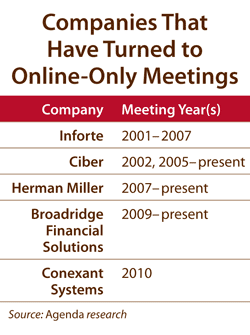|
The Shareholder Forum™ Purpose The Shareholder Forum provides all decision-makers – from the ultimate owners of capital to the corporate managers who use their capital, and all of the professionals in between – with reliably effective access to the information and views participants consider relevant to their respective responsibilities for the common objective of using capital to produce goods and services. Having pioneered what became the widespread practice of "corporate access" events over two decades ago, the Forum continues to refine its "Direct Access" practices to assure effective support of marketplace interests. Access Policies To provide the required investor access without regulatory constraints, the Forum developed policies and practices allowing it to function as an SEC-defined independent moderator. We also adopted well-established publishing standards to assure essential participant privacy and communication rights. These carefully defined and thoroughly tested Forum policies are the foundation of our unique marketplace resource for clearly fair access to information and exchanges of views. History We have been doing this for more than two decades. The Forum programs were initiated in 1999 by the CFA Society New York (at the time known as the New York Society of Security Analysts) with lead investor and former corporate investment banker Gary Lutin as guest chairman to address the professional interests of the Society’s members. Independently supported by Mr. Lutin since 2001, the Forum’s public programs – often in collaboration with the CFA Society as well as with other educational institutions such as the Columbia Schools of Business and Journalism, the Yale School of Management and The Conference Board – have achieved wide recognition for their effective definition of both company-specific and marketplace issues, followed by an orderly exchange of the information and views needed to resolve them. The Forum's ability to convene all key decision-making constituencies and influence leaders has been applied to subjects ranging from corporate control contests to the establishment of consensus marketplace standards for fair disclosure, and has been relied upon by virtually every major U.S. fund manager and the many other investors who have participated in programs that addressed their interests. Commitment The Forum welcomes suggestions for its continuing support of fair access to the information needed by both shareholders and corporate managers. Responding to the recent increases in investor engagement and activism, we have established a strong policy commitment to supporting corporate managers who wish to provide the leadership expected of them by assuring orderly reviews of issues. We will of course also continue to welcome the initiation of company-specific programs by shareholders concerned with the use of their capital to produce goods and services, and we naturally remain committed to addressing general marketplace interests in collaboration with educational institutions and publishers. |
|
The article below was published in Agenda, a Financial Times private subscription service for corporate directors, and is presented with permission. Note: Intel Corporation is a Leadership Supporter of the current Shareholder Forum's "Say on Pay" program addressing investor communication issues, and is represented on that Program Panel by Cary Klafter, referred to below as the company's executive officer responsible for relevant policies. |
Agenda, January 25, 2010 article
Could Traditional Annual Meetings Go On-line Only?
Article
published on January 25, 2010
Companies are experimenting
with holding their annual shareholder meetings entirely online, but the
movement is attracting backlash from activist investors who say eliminating
the in-person annual meeting will undermine corporate governance.
Online-only meetings have
their genesis in a revision to Delaware’s corporate law that was made in
2000. This clarified that companies did not have to hold their annual
meetings at a physical location open to investors.
|
